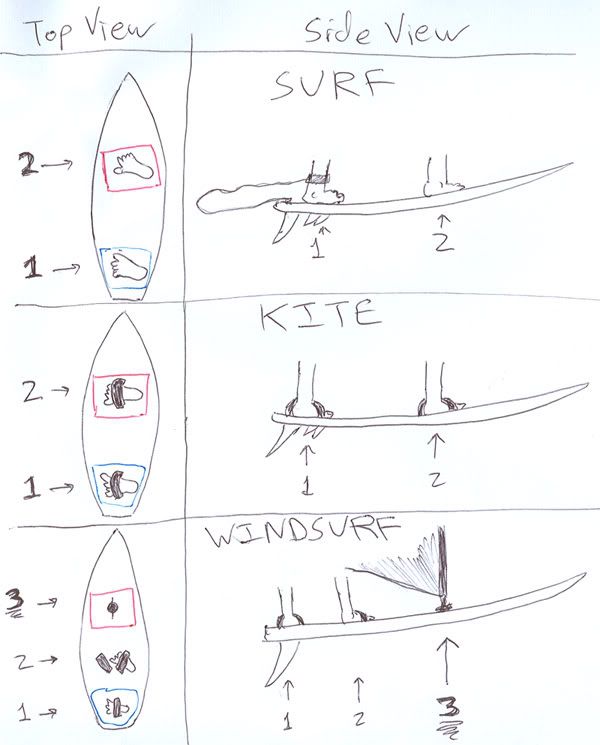All that confusion and retarded progression was because I didn't realize I had a THIRD leg. In fact, all men and women who windsurf have one. It's the mast base. What I was failing to do as a youth was to transfer weight up off my first two legs, through the sail, and down into the mast base. If I'd done that it would have been much easier to get my feet back in footstrap territory without sinking the tail. And by maintaining mast base pressure (MBP) when in the footstraps I could have distributed my weight more evenly for a less bucking and swerving ride.
If you compare a windsurf board against a surfboard or a directional kiteboard, you can totally see why the footstraps are so far back. It's because the mast base substitutes for the front foot.

Remembering to use that imaginary third leg is KEY to almost everything in windsurfing. There are different ways to apply MBP depending on what windsurfing situation you're in. Hanging down on the boom when accelerating onto a plane, extending the body and committing weight to the harness when striving for speed and control, pressing down on the boom and sheeting in during a hard carve or jibe intitiaton... the list goes on. He who controls his MBP controls his destiny.
When I first read the title to this post, I thought you were going to be talking about something else rather male-oriented. You meant that, didn't you?
ReplyDeleteThat's my story and I'm sticking with it.
-Ian
Great post James,I knew exactly what you meant. I am now working on using more mast base pressure. YOu possess a great amount of windsurfing knowledge. I am glad to be able to benefit from it.
ReplyDeleteScott
That third leg is not imaginary...it's darn near the whole show.
ReplyDeleteA misconception that holds intermediate windsurfers back from getting good on smaller boards and in higher winds is thinking that the boom and rig are only worked in two dimensions (sheeting in/out, tilting forward/aft). Actively using it to control board trim is crucial to waterstarting, speed, jibing, tacking, shlogging through shore break, wavesailing and so on. Learning some basic nonplaning freestyle (heck, just tweaking how tightly you pivot jibe) is great for learning to get subtle with this.
Ian- I'll confess to some mischevious intent with the title.
ReplyDeleteScott- Thanks for the complements. Regarding windsurfing knowledge, I consider myself an expert at being an intermediate. Now if only I could become an intermediate at being an expert...
Puffin- I like the 3rd dimension of rig control analogy. I'll have to start using that one!
http://www.ebbtidewindsurfing.com/Physics.cfm
ReplyDeleteGreat article on the subject.
Great thinking and website man!
ReplyDelete